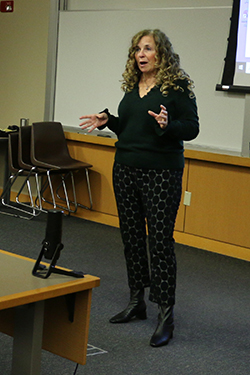On the eve before oral arguments were set to take place before the United States Supreme Court in United States v. Rahimi, Seattle University School of Law’s Professor Deirdre Bowen, director of the Family Law Center, organized a panel discussion with experts to analyze the potential impact of the monumental gun rights case.
At issue is whether a federal law that bans people subject to domestic violence protection orders from possessing guns while the order is in effect is a violation of the Second Amendment. The panelists stated that the court’s decision, which is due next year, may have life-threatening consequences for survivors of domestic violence, their families, and the public.
Bowen gave a legal explanation of how the involved parties were likely to argue.

“What Mr. Rahimi [the defendant in the criminal case and petitioner in the Fifth Circuit Court of Appeals case] is going to argue is that there are only two clear situations in which there has been a long-held history in the United States as it relates to gun regulation where the Second Amendment does not apply, and that involves people convicted of a felony and people who have been determined to be mentally ill,” Bowen said, noting that a protection order is civil, not criminal, in nature. “Individuals who are subject to a domestic violence protection order or restraining order are not necessarily criminally convicted individuals.”
She explained that the government would instead have to argue that firearms should also be kept from citizens who may be innocent of crimes but have demonstrated irresponsible conduct. This means that a court has determined that they are dangerous; it is consistent with gun regulation historically to keep firearms away from people who are deemed dangerous.
Bowen’s colleagues with the Firearm Injury & Policy Research Program at the University of Washington — postdoctoral scholar Julie Kafka and Professor Alice Ellyson — provided context and statistics about the connections between domestic violence offenders and gun violence.
“People who use violence against their intimate partners or family also tend to use violence outside of the home,” Kafka said. “More than two-thirds of fatal mass shootings in recent years have been tied to domestic violence.”
Retired Spokane Police Sgt. Jordan Ferguson, who now works for the Spokane Regional Domestic Violence Coalition, talked about the importance of keeping firearms out of the hands of abusers from a law enforcement point of view. He compared it to keeping car keys away from an inebriated person or keeping the keys to a school away from someone convicted of pedophilia.
“This is not a gun issue — this is a domestic violence issue,” he said. “This is not a gun grab. It’s a temporary removal of firearms from someone who at that point in time should not have one in their possession.”
All four of the speakers are collaborating on a CDC research grant to examine the effectiveness of gun removal in DV cases.

